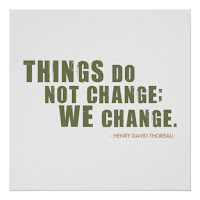Great leaders tend to be humble individuals that do not take
credit for things done well by others and often assume the blame for
experiments that fail. They tend to be self-effacing
individuals who display a fierce resolve to do whatever is needed to get the job
done right (and well) while channeling their ego needs from themselves to
building their department (organization or company). Strangely this description seems to go against
the way that companies have traditionally chosen their managers – promoting the
most competent, highly skilled achievers into positions that should allow
others to emulate their competence and accomplishments (unfortunately often
without any tools or training that might make this possible).
Ask most people who they feel are the true leaders of
industry and you will probably hear names like Jack Welch, Donald Trump (at one
time – perhaps not so much by not so many people now), the founders of Google,
Amazon or McDonald’s - or some other outspoken champion of change. While these individuals may be change agents,
they may not be effective in the “long term” as they tend to initiate change or
create new markets WITHOUT having the patience (or interest) in “seeing things
through” to their logical conclusion.
They may not be as able to foster employee “buy in to change” as would a
humble leader willing to lead others and pass on accountability (as well as
responsibility) to others. An effective
sports leader once said that it “was not his responsibility to BE stressed but
rather his duty to CREATE stress in others that would help them to grow.” Perhaps it could be better put that respected
leaders do not inflict pain but rather they bear the pain of others so that
organizational gain can rise from the growth achieved by overcoming individual pain. Perhaps greatness could be better measured by
the magnitude and efficiency of change – the number of people involved as
active participants in making the change happen and the impact of change on an
organization’s bottom line – rather than simply from doing things differently
or changing the “status quo” to make a mark on the world.
Humility is disciplined strength. Humble leaders are quick to give credit and
slow to accept praise. While a leader
must be competitive in order to grow an organization, the manager who takes all
the credit will find him/herself without a team to enact change. If two coaches were to take all the credit
for their team’s success (and blame their losses on the team’s an inability to
listen or learn), the “thrill of victory” and the “agony of defeat” would be
reduced to words and claims spoken without action – to a debate (that would
surely become a debacle) rather than an event worth watching.
Whenever we seek the cooperation of other people, whether
from a position of authority or not, we should speak honestly and
directly. Communications should be
plain, pointed and specific. Facts
should be stated, with any assumptions taken in arriving at the facts clearly
explained. After establishing one’s
frame of reference, the conclusions derived from the facts should be detailed
and discussion and/or dissension allowed in order to gain the support of others
required to initiate action. The best communications are spoken (in simple and
direct language that everyone understands) rather than written (within text
messages) or relayed through intermediaries.
Respect is not purchased by cashing in an astounding vocabulary – it is
earned by simply stating one’s position so that it can be clearly understood (discussed,
enhanced and explained fully) prior to its being acted upon. Leaders must recognize and understand that the
right to be heard (and the expectation to be listened to) is never
automatically given to anyone – and when assumed it does not (in and of itself)
give us the right to be taken seriously.
Being positive is always more effective in the long run than
being negative. Being direct and honest,
however, does not mean one is entitled to be demanding or degrading. Had you worked on a project for several
months only to have it “put on hold,” would you rather be told that you wasted your
time and efforts or that they helped to keep the organization from making a
serious mistake? Being positive with
others, even when putting something on hold or dismissing it, helps to maintain
an individual’s dignity and establish their worth. A leader’s integrity is not something that
can be given to or “bestowed” upon another – it must be earned by the words
spoken, the actions taken and the attitudes expressed every moment of every
day.
People respect individuals having integrity. Saying what you mean then doing what you say
are two of the greatest attributes that a leader could possess. Nobody is perfect – we are all human, and
humans make mistakes. The way we deal
with those mistakes, however, will either insure our ascension within an organization
or guarantee our fall. While leaders must provide a clear sense of direction
for their organization, they must also be honest in accepting not only the
credit for success but also the blame for failure. An individual able to do so will have gained
immense credibility within his or her organization – credibility that will
translate exponentially into positive results.
While charismatic or forceful leaders may produce “quick
fix” solutions with lower risks (cutting costs and making splashy, quick change
usually saves money in the short term), organizations are probably better off to
seek stability, long-term growth, and sustained success. In today’s environment of corporate (leadership)
distrust, perhaps more of us should learn how to balance ego with humility, put
corporate and employee growth before our own, then reap the rewards of
organizational success.
Humility in management should be one goal we all strive to
achieve. Once achieved, there would be
no greater way to recognize its assimilation than to honestly and selflessly
thank those around us for making it happen!


























